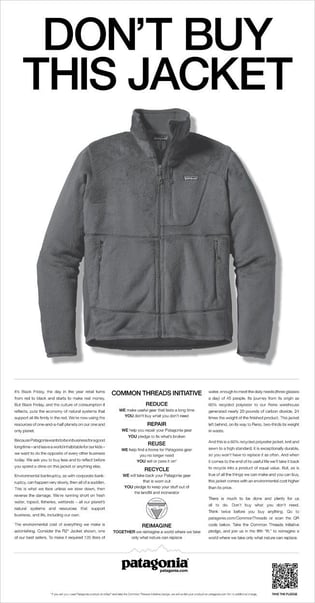Recently, outdoor apparel brand Patagonia announced that it will be moving away from adding corporate logos to its products. This decision was shared in a piece on the blog entitled "Beyond the Office, Out of the Landfill: Why We're Transitioning from Adding Logos." Patagonia stated, "What we’ve learned is that adding an additional non-removable logo reduces the life span of a garment, often by a lot, for trivial reasons." The life span of a fleece or vest is something incredibly important for Patagonia. This is why the brand claims to make gear that can be used for decades. According to Patagonia's article, "Using a garment for just over two additional years, for example, cuts its overall footprint by 82 percent."

Now, it doesn't take a PhD in Economics to realize that if Patagonia transitions away from branding its products with corporate logos, the brand stands to not sell as much. If Sally Sue can no longer get a Patagonia Synchilla with the logo for Company A on it, she won't have to buy a new one when she is hired by Company B. 
This, however, is far from Patagonia's first venture into sustainable practices. Environmental conscientiousness has long been at the forefront of who Patagonia is. Look no further than founder Yvon Chouinard's book, Let My People Go Surfing. Another example of Patagonia's sustainable practices is its website devoted to buying used gear. This is my favorite thing that the brand is currently doing. Even Patagonia's Twitter page is essentially now a hub for environmental activism.
Along with the decisions on logos and pushing pre-owned products, Patagonia has taken other courageous yet counter-intuitive approaches. One of its most famous ads, for example, was in The New York Times on Black Friday. The ad read, "Don't buy this jacket" and was call for consumers to think more sustainably about their closets.
But, Patagonia is not the only clothing company realizing the desperate need to change how we consume. In a recent ad, Levi's enlists the likes of Jaden Smith, Emma Chamberlin, and Marcus Rashford to discuss better buying habits. According to the denim brand, when we buy better, we buy less. When we buy less, we waste less. And, when we waste less, "We can change for good."
Sure, the ad is promoting the quality of Levi's products more so than saving the earth. Levi's still wants to sell jeans. And, its timing seems to suggest that it is trying to ride the energy of Earth Day. But, nevertheless, Levi's is promoting an extremely beneficial practice, and that message is resonating with audiences and aligning the brand with a cause consumers care about.
The environmentalist in me absolutely loves to see these ideas being backed by massive corporations like Patagonia and Levi's. Although their products are on the pricier side, I feel more comfortable paying for them, as I know that their values align with mine, and many consumers who see these ads may likely agree. These shared values also lead me to wearing my second-hand Patagonia Synchilla proudly and more often. Patagonia is a brand that believes in what I believe in, and I wouldn't have necessarily known that without these ad campaigns and initiatives. And this is what we can learn as marketers.
I believe that influential corporations have a responsibility to try and better the spaces in which the inhabit — whether it be the local community or, in Patagonia's case, the entire planet. As marketers, we get to participate in the conversations surrounding these spaces. However, our efforts will only be successful if we come from a place of sincerity and genuine care. That is why Patagonia's "Don't buy this jacket" campaign is so successful. It is more about saving the world than it is about selling a product. This care that I speak of comes from being customer-focused and empathizing with our fellow humans. If you are sincere in wanting to make positive change, the consumer will recognize this and invest themselves in your brand. You have to create ad campaigns that are backed up by your company's values and actions. I don't think marketing will save the world, but I do believe it can start the conversations that might.


